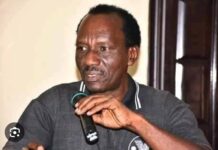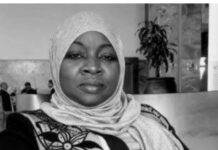My colleague, Soji Akinrinade, and I interviewed General Muhammadu Buhari when he was running for president for the third time in 2010 for Newswatch magazine. I was surprised that one thing weighed on his mind: indiscipline. I asked him why he obsessed over indiscipline rather than corruption, the monster killing our country at all levels.
He said: “Dan, indiscipline is worse than corruption.”
He knew what he was talking about. Buhari launched the first and only frontal attack on indiscipline in our country with his WAI, 31 years ago. We did not quite appreciate the true philosophy of the war then. We saw it in the rather mundane terms of the nation-wide monthly sanitation. Even if only that, it was an important war. It forced us to exercise our right to live in a clean environment.
The primary objective of WAI was to instill in us basic respect for other people’s rights. By the way, that is what the rule of law is all about. There is no way we can coat this with saccharine: Indiscipline has become so pervasive it has acquired a new stature as the badge of recognition for our big men and women and their minions. People do what they like to whom they dislike with impunity. There are no consequences. Would a new war against indiscipline be Buhari’s priority?
It may well be although I refuse to bet on it. We do not yet know how his mind is working, given the full plate of national problems piling up before him. At the said interview, Buhari was passionate about wrestling indiscipline to the ground if he won the election. I think he regards indiscipline as the senior brother of corruption. Once you corner and chain this rogue, corruption would find its feet made of jelly – and hear its own funeral dirge. My informed guess is that we are sure to find indiscipline on his agenda for rebuilding our nation.
My second guess is that if Buhari had asked all Nigerians to submit a list of the critical problems we would want him to tackle, every list would contain the following: insecurity, corruption, indiscipline, the economy and the removal of fuel subsidy.
All them touch all of us where it hurts. Corruption cheats us and our country; smart thieves corner our common wealth; poor economic husbandry, means that although ours is the largest economy in Africa, federal and state governments cannot pay their civil servants their monthly salaries; insecurity has made life in our country cheap, short and brutish; fuel subsidy is a brazen channel through which the sons and daughters of the rich and the influential are made instant billionaires. A country of two nations – one of superlative wealth and privileges and the other of the deprivation is a country in a race with itself towards the precipice. We expect Buhari to pull it back.
Chief Obasanjo’s think-tank, made up of eminent Nigerians such as Dr. Kalu Idika Kalu and Dr. Christopher Kolade, submitted a five-point list of key areas crying for the urgent attention of the new administration, to the president-elect last week Thursday. These key areas are education, the economy, power, security and infrastructure. The full report may not be open to the rest of us but given the calibre of members of the think-tank and their track record in matters of national development, we can rest assured that it is an informed report/recommendations intended to help Buhari lift this country from the murk of its immediate past failures.
Sadly, the list is sad. It humbles us. It shows how far we have travelled and what little distance we have covered since independence. I do not find it funny that fifty-five years after independence, we are still at the starting point in our national development. There is a lot of motion but no real movement from point A to point B, let alone from B to C.
We are plagued by poor power supply, insecurity, a crude oil dependent economy and infrastructure incapable of supporting our national development aspirations. You can see that despite the enormous powers of a Nigerian president, he is chained to yesterday’s millstone while striving to move the country from today to tomorrow. Our movement arrested by our much motion. A cruel irony.
The list is a cruel reminder that the new administration has to spend valuable time and resources cleaning up the Augean stable. The attitude of the outgoing administration to the mess in our education, for instance, was cynical, to say the least. It boggles the mind that a president with PhD and who came into politics from the classrooms failed to appreciate how truly dysfunctional our educational system had become. Instead he chose to pile up more mess on the system by playing politics with it. He set up federal universities in fourteen states against the professional advice of the National Universities Commission. Courting popularity was more important to him than giving the country a robust educational system geared to its aspirations and development. He also gratuitously approved all applications for new universities. Our country has been turned into degree mills. Little wonder, the profundity of our young graduates makes illiterates wince.
There is no way you would expect Buhari not to tackle corruption. Indeed, as soon as his victory was announced Obasanjo pointedly told him to be ready to face the monster. He was preaching to the converted. As I see it, the new president should be prepared to confront two institutional problems here. The anti-graft bodies, EFCC and ICPC, are not, to be polite about this, in a pretty shape. They were cynically starved of funds. Unable to do much without funds, they atrophied. The public has lost confidence in them and their pretences.
EFCC has a long list of high profile cases cluttering the dockets in the courts. The cases are never heard and the crooks and the thieves and the looters of our common wealth are laughing in our faces. Restoring public confidence in the anti-graft bodies would not be easy but without it, whatever the new president does about corruption would simply blow in the wind.
The judiciary should be Buhari’s most trusted partner in the anti-corruption war. Sadly this institution has a scrappy record in rising up to the challenges of serving God, not Mammon. Our peculiar attitude to the dispensation of justice has saddled us with a peculiar judiciary in which cases go on forever. The crooks and their crooked lawyers and equally crooked judges tie them down.
I am not saying anything new here. No one can pretend not to be aware of the corruption in the temple of justice. In all generalizations, the good and the ugly are lumped together. There are decent judges and decent lawyers who are truly committed to their sacred duty of making the temple of justice the true temple of justice. They resist the temptation to soil their hands. But by and large, the bulwark against tyranny and the refuge of the common man has become a hollow institution suffocating the common man and protecting the smart crooks and criminals.
Two strategies recommend themselves in what should be a renewed anti-graft war. The first is a shake up of the judiciary to bring it up to speed with contemporary societal demands for justice. The vice-president, Professor Osinbajo, a great law scholar and law administrator, should be given this important task. A true shake up in the judiciary would rid it, at least for some time, of some of the vermin on the bench who deliver judgments that virtually make first year law students weep.
As I see it, the anti-graft war as it is currently waged, is not result-oriented. It has lost steam and shows signs of mental sclerosis. EFCC and its expensive lawyers act as if it is their duty to fail in the prosecution of cases. They frame charges in ways they know no self-respecting judges would properly judge the accused. What should Buhari do to get EFCC and ICPC back on track?
My jury is still out.



